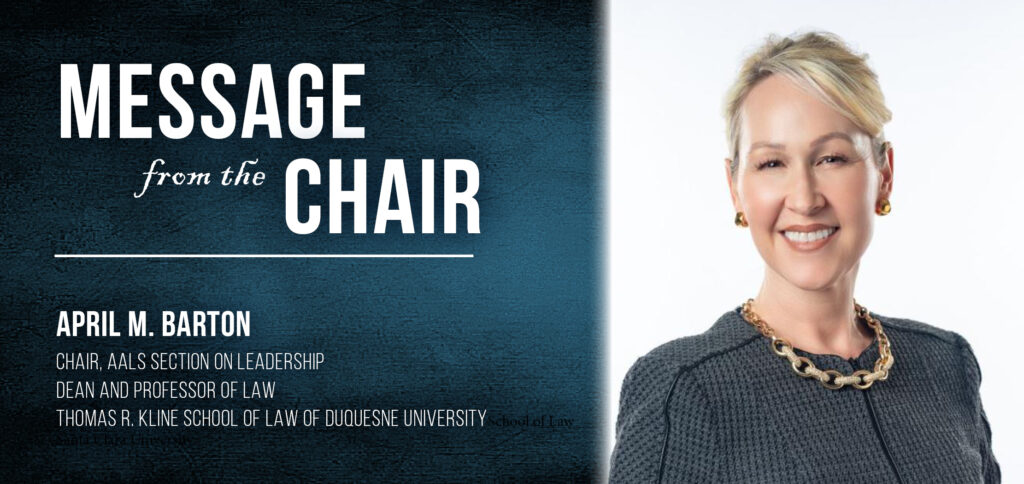
Dear AALS Leadership Section Members,
AALS President, Mark Alexander, has challenged us to embrace this year’s theme of Defending Democracy. “We have a special role to play in saving our democracy from the very real dangers that threaten us and our country. [O]ur democracy is the lifeblood of a free and fair society and … is worth being defended with action and resolve.”
How does this theme relate to our AALS Leadership section?
We must educate transformational leaders who will be positioned to serve in public office and other institutions that uphold our democracy.
We are witnessing a scarcity of leadership in our government institutions, most notably in our Congress and state legislatures. I am referring to true leadership—the kind that acts with integrity, respects the rule of law, understands respectful debate, and treats others with dignity and respect. These might sound like wistful qualities of yesteryear, but these qualities are very real and necessary to a healthy democracy and must be taught and reinforced.
Lawmakers must build coalitions, even with those with whom they disagree. They must listen and act respectfully. They must understand that compromise is essential in a functioning democratic system. We need leaders who display character, create collaborative cultures, and foster inclusive environments that uplift and inspire. Most importantly, leaders must be motivated by a higher good – our democracy and those whom we serve.
As legal educators, we can help our students understand what leadership is and what it looks like in action. Our students have a keen sense of character, service, and equity and we can reinforce and explore these qualities with them, empower them to embrace their innate compassion and humility and teach leadership skills that will equip them as they move forward to defend our democracy.
Sincerely,
April M. Barton, Chair
<>I am grateful to our outgoing Leadership Section Chair, Dean (now President!) Garry Jenkins, for his wisdom, leadership, and collegiality. I have learned much from him and appreciate all that he has done for our Section over the years. He is a shining example of exceptional leadership and we wish him the best in his new role as President of Bates College!
I am also grateful for our AALS Leadership Section 2023 Executive Committee who are already working hard to make sure we have programming for all of our members throughout the year.
Executive Committee Members are:
Lee Fisher, Chair-Elect
Dean, Cleveland State University College of Law
Joseph C. Hostetler-BakerHostetler Chair in Law
Martin H. Brinkley
Dean and William Rand Kenan, Jr. Distinguished Professor
University of North Carolina School of Law
Joan MacLeod Heminway
Rick Rose Distinguished Professor of Law
Interim Director, Institute for Professional Leadership
The University of Tennessee College of Law
Susan R. Jones
Professor of Clinical Law
The George Washington University Law School
Tania Luma
Assistant Dean, Diversity, Equity & Inclusion
Clinical Professor
Loyola University Chicago School of Law
Stephen Rispoli
Assistant Dean of Student Affairs and Strategic Initiatives
Director of Innovation and Scholarship, Executive LL.M. in Litigation Management
Baylor University School of Law
Hillary A. Sale
Associate Dean for Strategy
Agnes Williams Sesquicentennial Professor of Leadership and Corporate Governance,
Professor of Management
Georgetown University
Aric K. Short
Professor of Law & Director, Professionalism and Leadership Program
Texas A&M University School of Law
Leah Witcher Jackson Teague
Associate Dean and Professor of Law
Baylor University School of Law
Kellye Y. Testy,
President & CEO
Law School Admission Council
